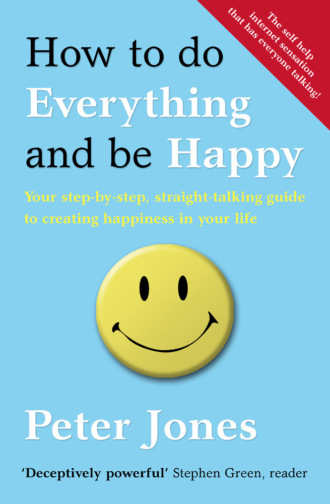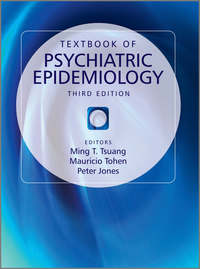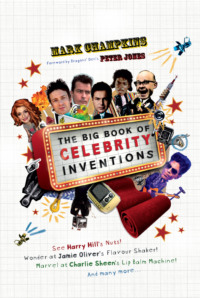
Полная версия
How to Do Everything and Be Happy: Your step-by-step, straight-talking guide to creating happiness in your life

How to Do Everything and Be Happy
Your Step-by-step, Straight-talking Guide to Creating Happiness in Your Life
Peter Jones

Praise for How to Do Everything and Be Happy
What a great book
A very accessible, practical guide to getting the most out of your life. It covers lots of ideas that I will be trying out over the next few months. However, the book offers these ideas without being in any way preachy or condescending, remembering that people are all different – and offering advice on how you can adapt the ideas to make them work for you. Highly recommended. I really enjoyed it!
Sarah (Chatham, UK), 17 June 2012
No-nonsense practical and friendly advice
This is a great book. It contains helpful methods to make you live a happier and more fulfilling life. The tone of the book is chatty, as if it is your best friend sitting next to you giving advice. I found the diary part and the setting of goals very useful. I am now implementing the ‘now’ list and ‘wish’ list. What truly stands out with this book is that whilst chronological in your development, it also takes time out to advise if something has gone wrong. It doesn’t steam-roller on to the end, leaving those behind who maybe haven’t achieved a goal or stage of the process. Peter dusts you down in a non-judgemental fashion and then continues his journey with you.
D.K. (UK), 2 July 2012
Very do-able
I love this book – it’s down to earth, practical, no-nonsense and, best of all, English. Unlike many American-style self-help books, it doesn’t promise miracles, just an eminently sensible way to make order out of chaos and make life enjoyable again, with lots of little (and big) bonuses along the way to treat yourself, love yourself and take control of your own life. Thank you, Peter, very much indeed.
S. Capes (UK), 7 July 2012
Absolutely love this book
I love this book so much. Like a lot of people, I often felt a bit ‘meh’ about my life. I wasn’t miserable, but I certainly wasn’t overwhelmed with joy. I didn’t want to emigrate, I didn’t want to change careers … I just wanted to feel a bit happier with my lot, really. Before I read the book, I’d started to make a few changes. Not massive leaps, just tweaks here and there. By the time I’d finished it, I’d taken a lot of the author’s advice and I’d tweaked a bit more. I can honestly now say that I have never been happier. Yes, I sometimes still feel ‘meh’, but these are fleeting moments, not general discontent. Thanks ever so much for writing it. I work in a library and intend to recommend your book to everyone. Even if they’ve only come in to use the photocopier.
Annie Latter (Essex, UK), 20 July 2012
Good, fun, easy read
Just finished the book! It was a great, easy read and I really enjoyed it. It was absolutely perfect for me in simply helping me to realise just how disorganized my life was. Two of my friends are on the ‘Happy’ bandwagon now, too : ) Great job on your book, Peter, and many wishes for your future success!
Heather (Texas, USA), 27 July 2012
Read more 5-star reader reviews
at amazon.com and amazon.co.uk,
or at howtodoeverythingandbehappy.com
Dedication
In memory of Kate,
her Big Theory of Everything,
and all the amazing things she taught me.
Love, as always,
Peter
Contents
Cover
Title Page
Praise for How to Do Everything and Be Happy
Dedication
To Begin With …
Why the Long Face?
Making Time to Be Happy
Doing Those Things You Always Wanted to Do
Pointing Your Life in a Better Direction
Making Life What You Want
Putting It All Together
You Still Here?
Footnotes
Acknowledgements
About the Author
Copyright
About the Publisher
To Begin With …
Once upon a time I got sold a dream: I would grow up big and strong, marry a blonde (my mother was convinced of this), have children, and live happily ever after in a big house, whilst I held down a job as an astronaut. Or a train driver. Or a fireman. And this wasn’t a ‘maybe’ – something to aspire to – this was my God-given right. This is what was going to happen. All I had to do was wait.
Not that I was very good at waiting. I’m still not very good at waiting! I wanted this idyllic life now. I didn’t want to wait until next week or some other distant point in the future.
I must have told my parents this because they would smile and tell me not to be in such a rush. ‘Peter,’ they would say, ‘schooldays are the best days of your life.’
Obviously they were mistaken. They had to be. When my parents’ eyes glazed over and they talked fondly of ‘schooldays’, they must have been recalling the days of their own distant childhood, days sitting around camp fires outside the school mud hut, marking bits of slate with chalk whilst village elders told stories of dragons. Their schooldays were clearly a far cry from the mixture of humiliation, bullying and boredom that I endured. They had to be. Because if they weren’t, for schooldays to be the ‘best’ days they would logically have to be followed by ‘something worse’.
Then I got older, and things got worse.
Actually, that’s not quite true. They didn’t get any worse – not really – but they certainly didn’t get much better, and they definitely got more complex.
‘Work’ turned out to be very similar to ‘school’ – different bullies, same rules, just as boring. And whereas I was given money in return for surrendering five days out of seven – more money than I’d ever dreamed possible – now there was a slew of people queuing up to take it away from me.
And then there were relationships. Just when I’d got classroom note passing down to a fine art, the game changed completely, and note passing wasn’t going to cut it.
I could go on, but suffice it to say, the initial ‘dream’ seemed less and less likely. It was clear that I was never going to be an astronaut. Or a train driver. Or a fireman. It also seemed unlikely that I would ever live in a big house. Big houses needed big money. I was on small to medium money. Two bedroom flat money.
Finally, on my thirty-second birthday, I realised there was a distinct possibility that I might never ever find ‘the blonde’.
This was a serious blow. Without the blonde I might never be married, I might never have children – and whilst I could probably cope without being married or having kids, or my blonde actually being a blonde, I couldn’t imagine being single for the rest of my days. That was unacceptable. Something had to be done.
So, for the first time in my life, I started to plan – to make lists, and take control of my own destiny. Many of the techniques in this book are nothing more than the skills I had to develop to avoid a life of bachelorhood. But it worked. Eventually I found the blonde. Took me a few more years, considerable effort on my part, and a somewhat unorthodox approach to dating, but I found her.
And we did marry.
And when she died in my arms three years later I was heartbroken.
People rarely ask me how Kate died. It’s just not the sort of question they feel comfortable asking. Most assume she must have had cancer – that we’d have had some warning. We didn’t.
I was off to our place in Croatia for a few days to finish my novel. Kate drove me to the airport and as she dropped me off she gave me the world’s biggest hug, bit back a few tears, thumped me in the arm, and told me she loved me – and that I’d better call her when I got to the other end.
I walked towards the main airport building, turned to give her one last wave. Something wasn’t right.
I could see our car, but not her.
The next few hours are a bit of a blur. I remember dropping my bags and running back to our vehicle. Taking her in my arms. The lady police officer trying to revive her. I remember the paramedics, the ambulance helicopter, being rushed to the hospital in the back of a police car. And I remember that god-awful waiting room, the stony faces of the doctors as they told me there was nothing they could do, that my wife was gone, and that they’d be switching off the life support machine.
Several hours later I drove our car back to an empty house.
I’ve learnt since that deaths like this (a sub-arachnoid haemorrhage, according to the certificate) are surprisingly common. Kate had had a weak part in her brain, probably since birth, and it could have happened at any moment. It was almost inevitable.
I’ve learnt too that after the shock comes the guilt. Every cross word, every nasty thought, every lie – they all come back to haunt you. And amongst the demons that were queuing up to torment me was the realisation that I wasn’t happy, and maybe I never had been.
There had been happy moments, of course. Quite a lot of moments. Most of them in the previous three years, and most of them down to Kate, but they were moments none the less. I wanted to be happy all the time. Not just occasionally. Not just for a moment. And for the second time in my life I decided to tackle a problem in the only way I knew how: by making plans, and lists, and taking control of my own destiny.
Welcome to How to Do Everything and Be Happy!
If you’re dissatisfied with your life, this book may be for you.
If you want to do something – anything – to increase the amount of happiness you feel, this book is probably for you.
And if you know how to use a pencil, if you own a diary, if you can make a list, if you’re moderately organised, or could be if you had a good enough reason to be, then this book is definitely for you.
Now then, let me tell you about this dream that I have for you …
Конец ознакомительного фрагмента.
Текст предоставлен ООО «ЛитРес».
Прочитайте эту книгу целиком, купив полную легальную версию на ЛитРес.
Безопасно оплатить книгу можно банковской картой Visa, MasterCard, Maestro, со счета мобильного телефона, с платежного терминала, в салоне МТС или Связной, через PayPal, WebMoney, Яндекс.Деньги, QIWI Кошелек, бонусными картами или другим удобным Вам способом.




